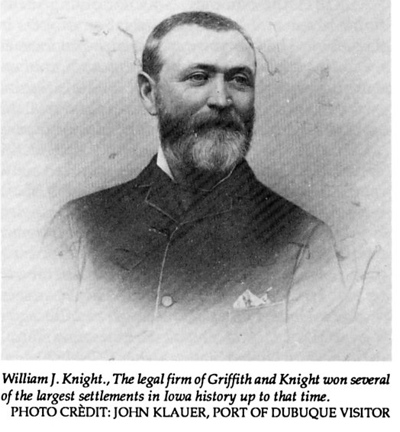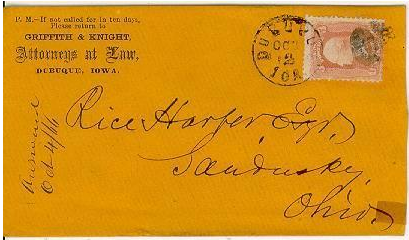Encyclopedia Dubuque
"Encyclopedia Dubuque is the online authority for all things Dubuque, written by the people who know the city best.”
Marshall Cohen—researcher and producer, CNN
Affiliated with the Local History Network of the State Historical Society of Iowa, and the Iowa Museum Association.
KNIGHT, William J.
KNIGHT, William J. (Kilkenny, Ireland, Mar. 3, 1838-Dubuque, IA, Feb. 23, 1908). MAYOR. Knight, partner in the law firm of Griffith and Knight, was one of the first attorneys to establish a practice in Dubuque. Knight studied law in the office of Jeffrey M. GRIFFITH during the years 1855 and 1856. In 1857 after successfully passing the bar examination at the age of nineteen, Knight joined his former teacher as a partner.
During his legal career, Knight participated in several of the most significant cases of his time. The case of Dubuque Elevator Company vs Illinois Central Railroad involved a claim of $400,000 and resulted in the largest legal fee ever paid to that date.
In 1869 Knight was elected to his first term as mayor. In 1S70 authority to lay water pipes in the streets was granted; the city agreed to take 100 hydrants. Of the water company John Thompson was president; the company had a capital of $300,000. In October, 1870, the water company was disbanded — had made a failure. Almost immediately afterward another water company was organized, with Mr. Chamberlain among its officials.
There was trouble over city bonds between the council and Mr. Thompson and others. It was at this date, at last, that the local bondholders united and demanded 100 cents on the dollar. The city refused temporarily to pay anything. It had become so firmly fixed in the minds of the city fathers that they could get a great reduction from creditors, that this action took them by surprise, dumfounded them, and they required time to collect their scattered senses. It was claimed that bondholders had bought the bonds at 25 cents on the dollar and now demanded 100 cents. Among the city bondholders here were P. A. Lorimier, Richard Bronson, J. T. Hancock, J. S. Randall, H. L. Stout, W. L. Bradley, R. A. Babbage, John Hodg- don, L. D. Randall & Co., Edward Langworthy, Alexander Levi and W. G. Stewart. These men in mass meeting announced their intentions to have 100 cents on the dollar. A resolution of Mr. Thompson was finally adopted by the mass meeting, viz. : To accept in lieu of their city bonds new 6 per cent twenty-five year bonds on the same conditions granted to outside creditors. The council refused to accept, and ordered suit brought for the recovery of the Thompson bonds, which, it was alleged, had been fraudulently transferred. In June, 1869, at a special election to decide on compounding the debt, the vote stood : Yes, 228; no, 265. Thus the citizens decided against the issuance of new bonds to pay the old debt. Under contract with the council William REBMAN graded down, leveled and planted with trees the old cemetery now called JACKSON PARK; all bodies were removed.
Knight was eventually elected mayor three times.
In 1872 as one of three attorneys who made up the Code Commissioners, Knight was assigned the task of codifying the criminal laws of Iowa. He ran successfully for the legislature in 1880 and was elected to the state senate in 1885.
--
Source:
Oldt, Franklin T. History of Dubuque County http://www.ebooksread.com/authors-eng/franklin-t-oldt/history-of-dubuque-county-iowa-being-a-general-survey-of-dubuque-county-histor-tdl/page-19-history-of-dubuque-county-iowa-being-a-general-survey-of-dubuque-county-histor-tdl.shtml



